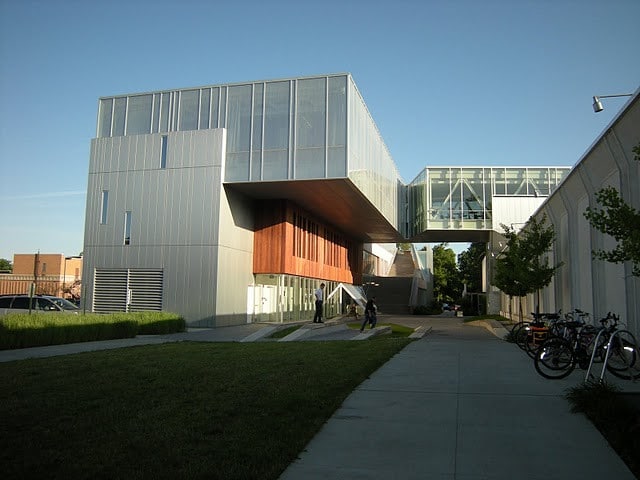Are you into music and dreaming of becoming a pro? Explore the best music schools in the Midwest! Discover places where playing instruments and making tunes is super cool. With awesome teachers and top-notch facilities, these schools are perfect for anyone who loves music. If you’re a beginner or a music maestro, these schools in the Midwest are the place to make your musical dreams come true.
Best Music Schools In The Midwest
Oberlin College & Conservatory
- Where? Oberlin College campus near Cleveland, Ohio
- Degrees: Various
- Notable: National Medal of Arts in 2009
Situated near Cleveland, Oberlin College & Conservatory one of the best music schools in the Midwest offering a variety of music degrees. The college’s dedication to the arts was recognized with the National Medal of Arts in 2009, showcasing its commitment to excellence in musical education.
University of Michigan: Ann Arbor’s Artistic Hub
- Where? Ann Arbor, Michigan
- Degrees: Music, musical theater, drama, dance
- Notable: 130-year-old performing arts school
In the heart of Ann Arbor, the University of Michigan houses a 130-year-old performing arts school that goes beyond music. With offerings in musical theater, drama, and dance, it stands as a comprehensive hub for artistic pursuits. The school’s rich history and diverse programs make it a standout choice for aspiring musicians and performers.
Northwestern University
- Where? Evanston, Illinois
- Degrees: Various
- Notable: Bienen School of Music expansion in 2012, faculty includes members of the Chicago Symphony Orchestra
In Evanston, Illinois, Northwestern University stands as a beacon for aspiring musicians. The Bienen School of Music, notable for its expansion in 2012, offers a diverse array of music degrees. With a faculty that includes members of the prestigious Chicago Symphony Orchestra, students receive unparalleled guidance from seasoned professionals, creating a dynamic learning environment.
University of Cincinnati Conservatory
- Where? Cincinnati, Ohio
- Degrees: Bachelors, graduate
- Notable: High rankings in U.S. News and World Report, strong electronic media and dance departments
Located in Cincinnati, the University of Cincinnati Conservatory is an artistic gem, boasting high rankings in the U.S. News and World Report. Offering both bachelor’s and graduate degrees, the conservatory shines not only in traditional music education but also in innovative fields like electronic media and dance. Its commitment to diverse artistic disciplines makes it a standout choice for aspiring musicians seeking a well-rounded education.
Indiana University
- Where? Bloomington, Indiana
- Degrees: Various
- Notable: Jacobs School of Music with a vast array of music majors
Located in Bloomington, Indiana University stands out as a musical hub. The Jacobs School of Music, known for its vast array of music majors, offers diverse degrees, creating a dynamic and comprehensive educational environment for aspiring musicians.
READ ALSO: Can I Move to Africa? 10 Things to Know Before Moving
How to Choose a Music School
Location
The school’s location plays a vital role in your overall experience. Consider the environment—whether it’s a bustling city, a serene town, or something in between. Think about the cultural scene, as exposure to diverse music genres and performances can enrich your learning. Proximity to music venues, studios, and potential networking opportunities can contribute to your musical journey.
Accreditation
Accreditation is a key indicator of a school’s educational standards. Look for schools accredited by recognized music education associations or regional accreditation bodies. Accredited institutions adhere to rigorous standards, ensuring that your education meets recognized benchmarks. This recognition also holds weight in the professional music industry, enhancing the value of your degree.
Faculty
The faculty’s expertise and experience are crucial factors in your musical development. Research the faculty members—look for their credentials, performance history, and teaching approach. Faculty with real-world experience, perhaps as professional musicians or educators, bring a practical perspective to your education. Accessible and supportive faculty contribute significantly to a positive and enriching learning environment.
Program Offerings
Look for schools that provide a variety of programs and majors catering to your specific musical interests and career goals. Whether you’re inclined towards performance, composition, music education, or technology, a school with a broad spectrum of offerings ensures you can tailor your education to your unique aspirations.
Consider the curriculum structure, the availability of electives, and any specialized tracks that align with your musical preferences. A well-rounded program will expose you to different facets of music, fostering a holistic understanding and skill set.
Reputation
The school’s reputation within the music community is a significant determinant of its overall quality. Explore the school’s standing in music education rankings and seek insights from current students or alumni. A reputable institution often attracts distinguished faculty and fosters a supportive and challenging learning environment.
Evaluate the school’s history, its contributions to the music industry, and any notable achievements or awards. A positive reputation not only reflects the quality of education but can also open doors to valuable opportunities, including internships, collaborations, and post-graduation prospects.
Alumni Success
The success of a school’s alumni serves as a testament to the effectiveness of its music programs. Investigate the achievements of past graduates—whether they have excelled in performance, composition, teaching, or other musical endeavors. Alumni who have made significant contributions to the music industry showcase the school’s capacity to nurture talent and pave the way for successful careers.
Consider the alumni network’s strength, as it can provide valuable connections and support throughout your musical journey. Reach out to alumni if possible, gaining insights into their experiences and the impact the school had on their professional paths.
Conclusion
Choosing the right music school is like composing a symphony of your educational journey. Look for schools with diverse programs aligning with your musical passions. A comprehensive curriculum, with varied electives and specialized tracks, ensures a well-rounded musical education tailored to your aspirations. Beyond programs, explore a school’s reputation—rankings, faculty, and contributions to the music industry. Success stories of alumni further validate a school’s ability to nurture talent and pave the way for fulfilling musical careers.

